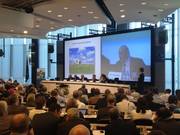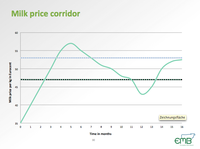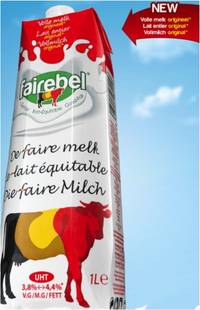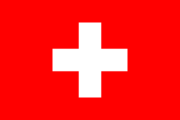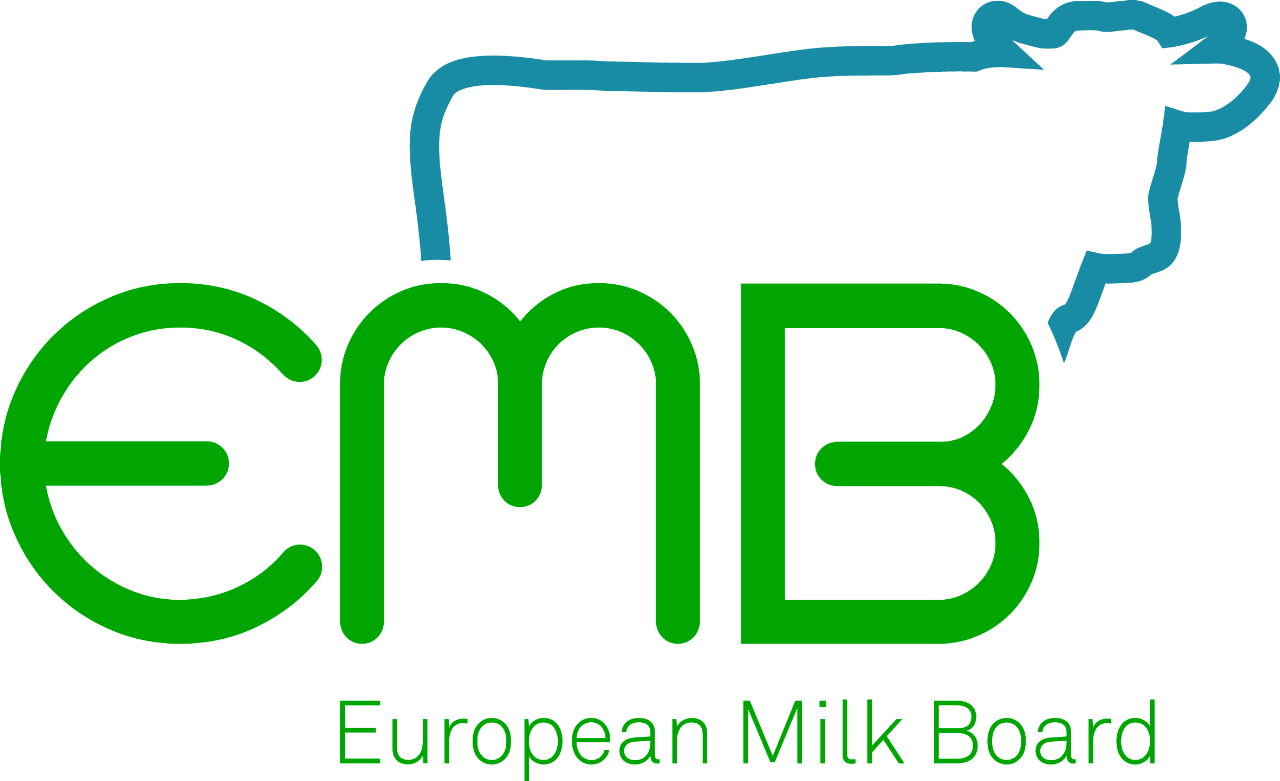EMB Newsletter October 2013
Newsletter as PDF
Contact
European Milk Board
Rue du Commerce 124
B-1000 Brussels
Phone: 0032/2808/1935
Fax: 0032/2808/8265
E-Mail: office@europeanmilkboard.org
Website: http://www.europeanmilkboard.org
Newsletter as PDF
Contact
EMB - European Milk Board asbl
Rue de la Loi 155
B-1040 Bruxelles
Phone: +32 - 2808 - 1935
Fax: +32 - 2808 - 8265
Dear Dairy Farmers and Interested Parties,
The conference on the future of the milk market after 2015, a conference of considerable importance to us dairy farmers, was held in Brussels on 24 September. We dairy farmers in the EMB put on a good performance and came across as a constructive voice in the dairy sector equipped with scientific expertise. So we can be extremely proud of our achievements – especially in the face of the supposedly powerful dairy industry and its associations. All their money and highly paid professional lobbyists have achieved nothing for them. When the issue is milk, it is still the farmers who espouse good prospects for the future with expertise and, above all, with heart and soul.
Following the disappointments about the outcome of the reform of the organisation of the European agricultural market – in which sensible measures such as the voluntary production cuts unfortunately generated no interest – this conference did us dairy farmers good. As reported in this EMB Newsletter, the European Commissioner for Agriculture Dacian Ciolos announced in his opening speech that the European Commission was planning to set up a monitoring agency for the milk market. The aim is to create greater transparency and with it less price volatility in the market. However, whether this aim can be achieved without instruments for flexible supply management is still highly questionable. At any rate the first step has been taken, though, and it is certainly possible that the monitoring agency can be given more powers in the future.
The important thing now is for us dairy farmers to take the European policy-makers at their word and for the European Commission to carry on its good initiative. The Commission intends to evaluate the milk conference and draw conclusions from it by the end of the year. It is vital that the Commission specifies measures and instruments for the milk market that are as concrete as possible.
Unfortunately the timeframe until the end of Commissioner for Agriculture Ciolos’s term of office in the middle of next year is short. That is why it is imperative that new and above all legally binding proposals from the European Commission be put on the table by then. We dairy farmers in the EMB will therefore support the European Commission’s positive path in the next few months – no matter where – yet pipe up loudly in Brussels if it veers away from this path.
Romuald Schaber (President of the EMB)
EU Commissioner for Agriculture announces setting up of a monitoring agency for the milk market
According to a statement made in Brussels on 24 September by the European Commissioner for Agriculture Dacian Ciolos during the major conference on the future of the EU milk market after 2015, the European Commission is planning to set up a monitoring agency for the milk market. On a monthly or quarterly basis, this agency is to report on the development of milk production and consumption, thus softening the impact of increasing price volatility in the milk market after 2015. It could therefore operate as an early warning mechanism for severe imbalances in the market. The Commissioner said thought still had to be given to the precise structure and configuration of the monitoring agency.
Milk conference in Brussels: European dairy farmers present scientifically based proposals for EU milk market after 2015
The following press release was published on the occasion of the conference "The EU dairy sector: developing beyond 2015" on 24 September 2013 in Brussels.
(Brussels, 25th September 2013) About 450 representatives of the whole dairy sector as well as of the European Institutions met yesterday at a conference in Brussels in order to discuss about the future of EU milk markets after the abolition of milk quotas in 2015. At the conference, the European Commission presented the results of a large study on the EU milk market after 2015, to which the different actors of the EU milk sector were invited to react. The European Commission's intention is to use the information and opinions collected at the conference as a basis when deciding on whether further legislative measures need to be taken for the milk sector.
Publication of scientific study on the EU monitoring agency
The key demand of the European Milk Board (EMB) for a European monitoring agency aimed at flexible supply management in the EU milk market has been scientifically substantiated for the first time by a study. The expert opinion was drawn up by the Büro für Agrar- und Regionalentwicklung (Office for Agricultural and Regional Development) in Germany headed up by scientist Dr. Andrea Fink-Keßler and was officially presented in Brussels on 24 September at a conference on the future of the EU milk market after 2015.
The starting point of the study is the European milk crisis of 2008/09 and the deregulation of the EU milk markets that started back in 2003.
New fair whole milk started in Belgium
In Belgium the Fair Milk product family initiated by the EMB in Europe has a new member. After the successful launch of the semi-skimmed milk, the chocolate-flavoured whole milk and an ice-cream, the Faircoop co-operative’s range has now been extended by a whole milk under the Fairebel label. The majority of Faircoop members belong to the Belgian EMB affiliate MIG.
Fairebel whole milk was officially presented to the public on 28 September 2013 at a press conference in the heart of Brussels. Living cows and the EMB’s well-known colourful artificial cows, the Faironikas, created an incomparable backdrop, making the opening event on that day a welcome attraction for interested members of the public and families with children.
Report from Switzerland
Milk prices in Switzerland continue to be too low. BOM, the inter-branch organisation dominated by retail chains and milk processors, does not intend to raise the target price. Although the target price is only a recommendation, an increase which the producers have been demanding for months would certainly send out the right signal to the players.
EMB Calendar
Please find below some of the most important events in October 2013:
14.10.: Advisory group on CAP of the European Commission in Brussels
15.10.: Meeting of the EMB board in Brussels
Full Texts
EU Commissioner for Agriculture announces setting up of a monitoring agency for the milk market
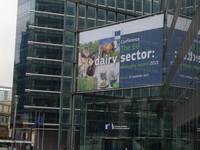
According to a statement made in Brussels on 24 September by the European Commissioner for Agriculture Dacian Ciolos during the major conference on the future of the EU milk market after 2015, the European Commission is planning to set up a monitoring agency for the milk market. On a monthly or quarterly basis, this agency is to report on the development of milk production and consumption, thus softening the impact of increasing price volatility in the milk market after 2015. It could therefore operate as an early warning mechanism for severe imbalances in the market. The Commissioner said thought still had to be given to the precise structure and configuration of the monitoring agency.
The European Milk Board regards the European Commission’s plan to set up the market monitoring agency as a first step in the right direction. Transparency in the market is absolutely essential to being able to react flexibly and promptly to imbalances in the market. However, what is still imperative is for the agency to have the power to actively control supply in the milk market. Only then can the negative consequences of severe price volatility for producers and consumers be combated effectively.
Christian Schnier (EMB)

